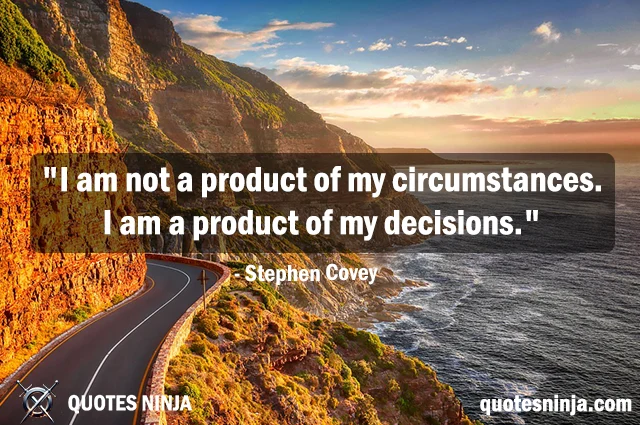
Wisdom Quote: “I am not a product of my circumstances. I am a product of my decisions.” attributed to Stephen Richards Covey was an American educator, author, businessman, and speaker. His most popular book is The 7 Habits of Highly Effective People.
Deeper Meaning of Wisdom Quote
The quote “I am not a product of my circumstances. I am a product of my decisions.” by Stephen R. Covey emphasizes the power of personal responsibility and choice over external conditions.
🔍 Breakdown of the Quote:
➤ “I am not a product of my circumstances”
This means:
- Your environment, past, upbringing, or external challenges do not define who you are.
- You are not limited or determined by what happens to you.
- Circumstances are often beyond your control (e.g., family background, economic status, societal barriers).
➤ “I am a product of my decisions”
This means:
- Your choices, attitude, and responses to life’s situations are what shape you.
- You have the power to influence your path, even when things are difficult.
- Growth, success, and character come from how you choose to act, not what happens around you.
🌱 Core Message:
We are not passive victims of our environment — we are active agents in our lives. Our decisions, not our conditions, determine our destiny.
Here’s a story inspired by Wisdom Quote “I am not a product of my circumstances. I am a product of my decisions.”
Wisdom Story: “The Road Beyond the Tracks“

Crossing the Tracks:
Malik had grown up on the wrong side of the train tracks — literally. In the town of Weston, the tracks divided the prosperous from the poor. On one side, manicured lawns and white picket fences stretched for blocks. On the other, cracked sidewalks, broken streetlights, and buildings with boarded-up windows painted a very different picture.
Yet Malik never blamed the town. He didn’t even blame the tracks.
As a boy, he watched his mother work three jobs to put food on the table. His father had left when he was six. From then on, Malik carried more than a schoolbag — he carried responsibility. Every afternoon, after walking his younger sister home from school, he would sit at the kitchen table and do his homework while heating up instant noodles.
At school, some teachers looked at him with pity. Others barely looked at him at all. A few times, he heard whispers: “Another kid from the East End. Don’t expect much.” Those words stung, but what burned more deeply was the feeling that people expected him to fail.
However, Malik made a decision early on — he would not become the story everyone had already written for him.
Instead of giving in to the noise, he began to write a story of his own.

Early Morning Study Session:
He started by setting his alarm an hour earlier than necessary. While the rest of his neighborhood slept, he studied. He used the silence of dawn to learn algebra, read history, and write essays. Every small effort stacked up. He didn’t have internet at home, but he spent hours at the public library, sometimes missing meals just to finish assignments.
Moreover, Malik made a habit of saying no. No to skipping school. No to fights. No to peer pressure. Some of his friends mocked him; others drifted away. But every “no” was a silent “yes” to a future he could feel pulling him forward.
One afternoon, after a math test, his teacher, Ms. Carter, stopped him.
“Malik, your score is the highest in the class,” she said, eyebrows raised. “Have you thought about college?”
Until that moment, he hadn’t. College felt like something reserved for the kids across the tracks. But Ms. Carter’s words lit a spark.
That night, he sat at the kitchen table again. Across from him, his little sister colored quietly.
“Do you think I can go to college?” he asked her, not expecting a real answer.
She looked up, grinning. “Of course. You’re the smartest person I know.”

Acceptance Letter Moment:
Those words meant more to him than any grade.
Encouraged, Malik began applying for scholarships. He wrote dozens of essays. Each time he hit “submit,” he felt like he was launching a piece of himself into a world that had once seemed closed off.
Rejections came first. Plenty of them. But he kept going.
Finally, a letter arrived from a state university. It read: Congratulations. He had won a full scholarship — not because of his address, but because of his decisions.

Graduation Day:
His first day on campus was overwhelming. Surrounded by students from all walks of life, he felt the old tug of doubt return. However, he reminded himself: You’re here because you chose to be. You earned it.
Four years passed quickly. Malik graduated with honors, earning a degree in mechanical engineering. He walked across the stage, his mother crying in the front row, and his sister screaming his name.
But the story didn’t end there.

Giving Back:
He returned to Weston, not to stay behind, but to lift others. He started a mentorship program for students from underprivileged neighborhoods, teaching them not just algebra and essay writing, but the power of choice. He told them the truth: “Your surroundings don’t decide your future. Your choices do.”
Every time a student walked into that program with doubt and left with direction, Malik saw a reflection of himself. And every time he told his story, he made sure to say: “I am not a product of my circumstances. I am a product of my decisions.”
Here is the ending of wisdom story form the quote “I am not a product of my circumstances. I am a product of my decisions.”
Moral of the story:
- Choice over victimhood: Malik never let his background define him.
- Hard work and discipline: His success was the result of consistent, conscious decisions.
- Empowerment through action: He chose to return and empower others, completing the full circle of growth.
To explore more on stories and dive into related ideas, be sure to check out the other posts where we cover all sort of stories related to quotes. Stay tuned for more…..
To explore more on quote topics, be sure to check out the other topics where we cover all categories of quotes. Stay tuned for more…..


Hello to all, for the reason that I am actually keen of reading this webpage’s post to be updated on a regular basis.
It consists of fastidious material.
Hello, after reading this remarkable article i am too delighted to share my knowledge here with friends.
Thanks for finally writing about > I am not a product of my circumstances……
– Quotes Ninja < Liked it!
I love the efforts you have put in this, appreciate it for all the great articles.